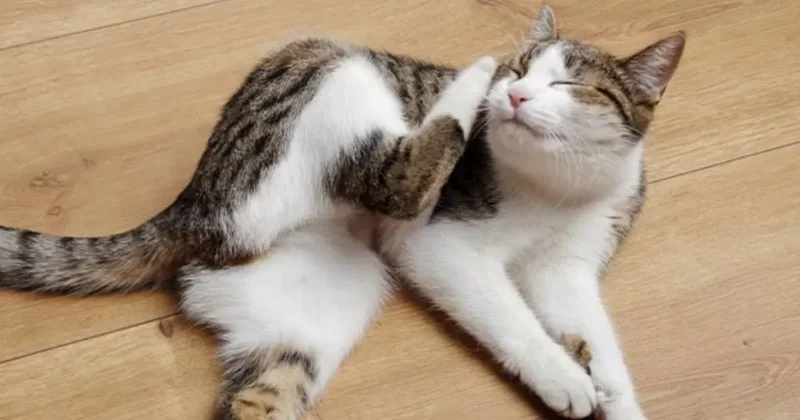- understanding-why-your-cat-is-scratching-constantly
- common-causes-of-cat-scratching-ears-and-face
- when-to-worry-and-seek-veterinary-help
- a-real-story-felix-and-the-mystery-itch
- diagnosis-and-treatment-what-to-expect
- how-hidden-brook-veterinary-can-support-your-cat
1. Understanding Why Your Cat Is Scratching Constantly
If you’ve recently found yourself googling “cat scratching ears and face constantly”, you're not alone. This is one of the most common concerns among cat owners—and for good reason. When cats scratch obsessively at their ears, cheeks, or head, it’s often a red flag that something deeper is going on than just a temporary itch.
Occasional scratching is normal. But when it becomes frequent, intense, or results in redness, bleeding, or hair loss, it’s time to dig deeper. Understanding the root causes early on can save your cat from unnecessary discomfort—and potentially prevent a more serious health issue.
2. Common Causes of Cat Scratching Ears and Face
Cats are masters at hiding pain, but their scratching behavior often reveals the first clues. Here are some of the most common underlying reasons:
2.1 Ear Mites
These tiny parasites are notorious in both kittens and adult cats, especially in rescue or outdoor populations. Symptoms include constant ear scratching, dark waxy discharge, and head shaking. Ear mites are highly contagious between animals and need prompt treatment.
2.2 Allergies
Just like humans, cats can develop allergies to food, pollen, dust mites, or even flea saliva. Allergic reactions often manifest as itchy skin, particularly around the face and ears. An elimination diet or allergy testing can help uncover the culprit.
2.3 Skin Infections or Dermatitis
Bacterial or fungal infections, such as ringworm, can cause severe itching and inflammation. In some cases, scratching introduces more bacteria into the skin, creating a vicious cycle. Dermatitis, caused by irritants or allergens, can also cause similar symptoms.
2.4 Foreign Bodies
A grass seed or piece of dirt lodged in the ear canal can drive your cat into a scratching frenzy. If your cat is pawing at just one ear and seems especially agitated, a foreign object may be the issue.
2.5 Behavioral Stress or Anxiety
Sometimes the cause is psychological. Cats under stress may over-groom or scratch excessively, especially around the head and ears. If medical causes are ruled out, behavioral patterns should be considered.
3. When to Worry and Seek Veterinary Help
If the scratching persists for more than a day or two, leads to open sores, or is accompanied by head shaking, discharge, or behavioral changes, it’s time to consult a veterinarian. Waiting too long can cause infections to worsen, making treatment more complex and costly.
It’s also important to resist the temptation to treat the issue with over-the-counter ear drops or human medications—many of which are toxic to cats. A vet can perform proper diagnostics like ear swabs, skin scrapings, or allergy panels to identify the true problem.
4. A Real Story: Felix and the Mystery Itch
Felix was a five-year-old tabby who had always been healthy—until his owner noticed him scratching at his ears and rubbing his face on the carpet every few minutes. Over the next 48 hours, the behavior intensified, and small scabs began to appear on his cheeks.
When he was taken to a clinic, the vet discovered a severe ear mite infestation that had caused a secondary bacterial infection. Thanks to early intervention and the right treatment plan, Felix recovered fully in two weeks—but the vet mentioned that another week of delay could’ve led to hearing loss or deeper skin infections.
Stories like Felix’s highlight why prompt veterinary attention is crucial when you notice constant ear or face scratching in your cat.
5. Diagnosis and Treatment: What to Expect
At the clinic, your vet will start with a thorough physical exam and ask for details about your cat’s behavior, recent diet changes, environment, and any exposure to other animals. Depending on what they find, diagnostics might include:
- Otoscope exam of the ears
- Cytology to check for bacteria or yeast
- Skin scraping or biopsy
- Allergy testing or elimination diet trials
Treatment may involve ear cleaning, antibiotics, anti-parasitic medications, or antifungal creams—sometimes all three. For allergy-related cases, long-term dietary adjustments or immunotherapy may be recommended.
6. How Hidden Brook Veterinary Can Support Your Cat
At Hidden Brook Veterinary, we understand how distressing it can be to see your cat in discomfort. Our team is equipped with advanced diagnostic tools and years of feline care experience to accurately identify what’s causing your cat to scratch and how to treat it quickly and effectively.
We also prioritize comfort—both yours and your cat’s. From gentle exams to personalized treatment plans and follow-up care, our goal is to restore health without stress. If your cat is showing signs of persistent scratching, don’t wait. Early care can make all the difference.











